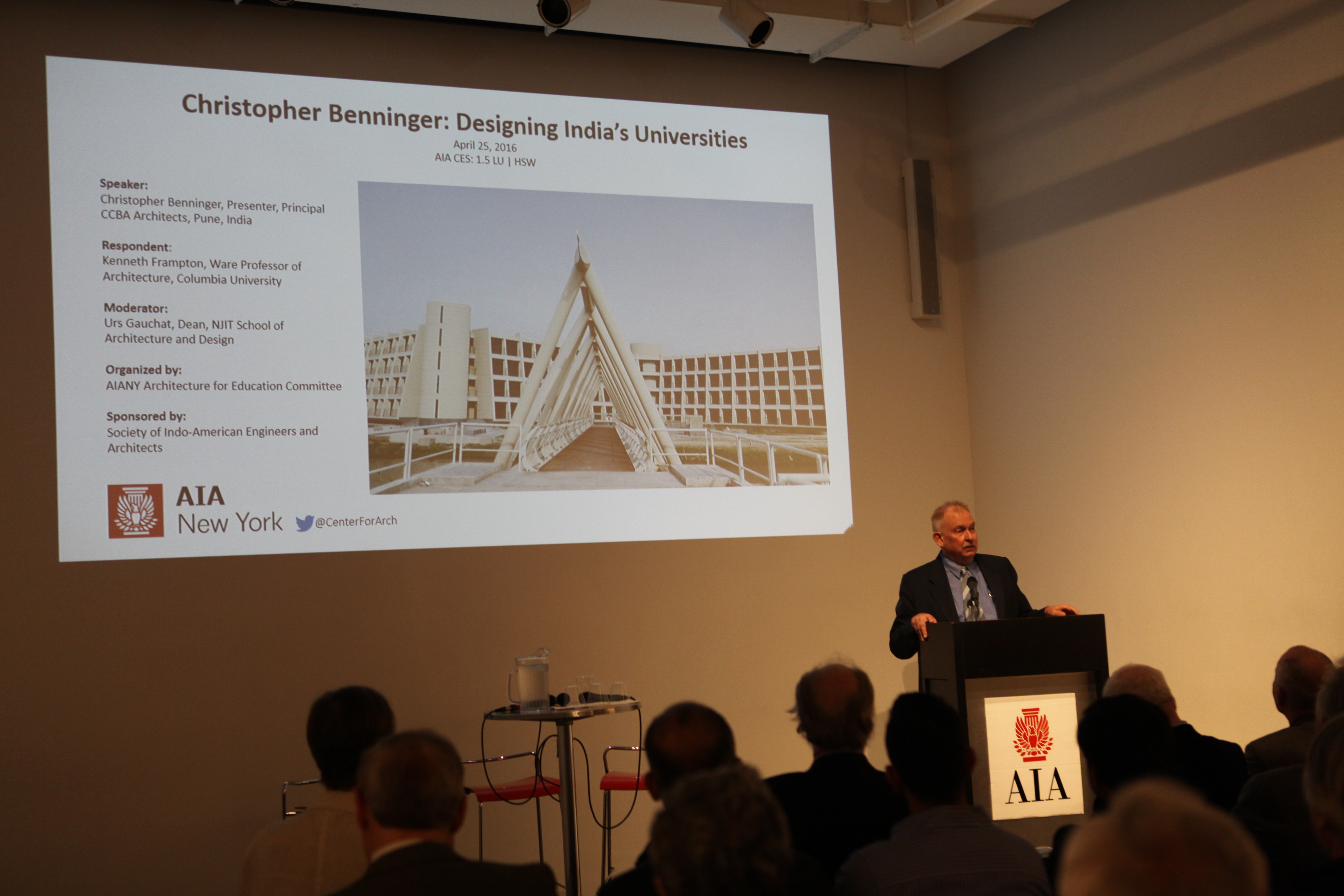by: Daniel Fox
Christopher Benninger “develops wonderful places to learn,” stated Dean of NJIT School of Architecture and Design, and moderator of the night, Urs Gauchat, Hon. AIA.
During 04.25.16’s lecture at the Center for Architecture, featured speaker Christopher Benninger, Principal of CCBA Architects in Pune, India, walked through the designs and methodology of educational institutions his studio has designed in India over the past 40 years. Historically, higher education had been an elite activity in India, but 15 to 20 years ago, the country began to allow private enterprises to found educational institutes. There followed a boom of universities.
Throughout the program, the theme that continually surfaced was the idea of a “culture of construction,” which involves many factors including (but not limited to) “local skills, local materials local industries” and local traditions, Benninger said. Living in India, he was steeped in a multitude of historical influencers, including traditional Indian educational systems and centers, and he uses these local historical education systems to inform his work. In the Center for Development Studies and Activities, Benninger borrowed from the Ashram typology, planning a campus in which interactions between small groups of teachers and students occur in intimate settings. Nestled in the hills, a palate of local materials and craftsmanship showcases artifacts existent on the site.
Environment is also a strong influencer in Benninger’s work. Intense heat, heavy rains, and lack of funding for equipment like air conditioners, are just a few factors his studio has had to deal with in designing educational institutes. The Alliance Français, completed in 1973, points windows towards the prevailing winds and employs a solid façade on walls facing the harsh sunlight during the day. To bring in natural light, skylights run the length of the buildings, and large windows on hinges studio spaces act as doors that can be opened during the day. The Kiloskar Institute of Advanced Management Studies acts as both a school for water management and is, in and of itself, an exemplar in water management. Following the natural curves of the site’s landscape, these contours become waterways for natural pools throughout the campus. Though the area is drought-prone, the city of Pune also receives heavy seasonal rains. The roof designs are steep, a nod toward traditional Indian temple roofs, but also serve a practical purpose in the rainy season. As the rain runs off the roofs, rainwater is collected and funneled in troughs along the roofs edges to be re-used in the campus landscape. Kenneth Frampton, Ware Professor of Architecture at Columbia University, articulated that this “moderation of landscape and climate becomes more crucial in the modern time.”
Frampton concluded the evening by putting Benninger’s work into context. His work “finds local languages and methods to work at a large scale,” an impressive feat he has carried throughout his career. Gauchat called Benninger “a marvelous chameleon using the expectations of the occupants who live in the space” to develop educational institutes in the context of India’s historical, educational, and environmental fabric.
Event: Christopher Benninger: Designing India’s Universities
Location: Center for Architecture, 04.25.16
Speakers: Christopher Benninger, Principal, CCBA Architects; Kenneth Frampton, Ware Professor of Architecture, Columbia University; Urs Gauchat, Hon. AIA, Dean, NJIT School of Architecture and Design
Organized by: AIANY Architecture for Education Committee
Sponsored by: Society of Indo-American Engineers and Architects








